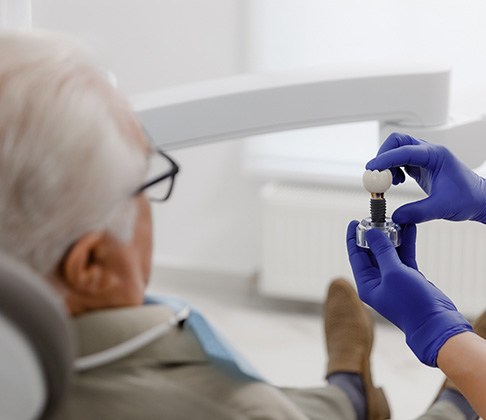Dental Implants – Sachse, TX
Turn Back the Clock on Tooth Loss

Do you avoid saying certain words, eating certain foods, or showing your smile because of the empty spaces caused by missing teeth? Dentures and dental bridges can give you the appearance of a complete smile, but only one tooth replacement feels and functions like your natural teeth – dental implants. At Wiese Dental, Dr. Robert G. Wiese can provide start-to-finish dental implant treatment that lets you turn back the clock on tooth loss. Call our dental office today to get started with tooth replacement using dental implants in Sachse, TX!
Why Choose Wiese Dental for Dental Implants?
- Dental Implants Placed & Restored in One Location
- Carestream CBCT Scanner for Expert, Ultraprecise Treatment Planning
- Empathetic Dentist with 35+ Years of Experience
What Are Dental Implants?

Dental implants are prosthetic tooth roots, usually made from titanium, that are surgically positioned within the jaw. Their biocompatible properties encourage the jawbone tissue to grow around the implants until they’re just as securely attached as the roots of your natural teeth. Then, we can restore the implants with a customized dental crown, bridge, or denture and rebuild your smile with a stable, long-lasting solution no matter how many teeth you’ve lost.
The 4-Step Dental Implant Process

Since dental implants are fairly complex, they take longer to get than other tooth replacements. Patients can only receive complete ones after about 4-6 months of treatment. Even so, don’t worry; these posts are worth their time and effort! Dr. Wiese performs the placement in-house, so you’re sure to get a restored smile that looks gorgeous and feels great. He and our team oversee the entire implant process – the consultation, implant surgery, osseointegration, and delivery of the final restoration.
Initial Dental Implant Consultation

As the process starts, you’ll consult Dr. Wiese at a consultation visit. This session lets us confirm your treatment goals, the state of your oral health, and other such factors. Learning these details will help us see if dental implants suit you, ensuring we tailor a proper treatment plan.
If you don’t qualify for dental implants at first, don’t feel discouraged. You can become a good candidate later through preliminary services like gum disease therapy or tooth extractions. After all, those procedures would strengthen your mouth and jaw to support implant posts.
Dental Implant Surgery

You’ll proceed to dental implant surgery if your consultation goes well. For that phase, Dr. Wiese will handle everything in-house instead of referring you to specialists. That means you’ll greatly benefit from our dental team’s extensive dental implant experience.
More specifically, the dental implant surgery will involve:
- Anesthesia – Dr. Wiese will numb your mouth with anesthesia before surgery. That way, the following placement work will be painless; it won’t cause you to feel aches or pains.
- Minor Incisions – Once the anesthesia “kicks in,” we’ll make an incision in your gums. This cut lets us make room in your mouth for your implant post.
- Implant Placement – Our team will use advanced tools and methods to place your implant post. To that extent, your new “tooth” will look gorgeous and work effectively.
- Gum Closure – Dr. Wise will quickly (and safely) close your gum incision after placement. From there, he’ll set a cap over your new implant.
Dental Implant Osseointegration & Abutment

Your implant will start fusing with your jaw’s tissue soon after surgery. Through this 4–6-month process (i.e., osseointegration), your new “tooth” will take root and become secure. That means your dental implant will become a permanent part of your mouth.
Once your implant fully fuses, you’ll undergo an “extra” surgery. This latter procedure places an abutment – a small metal connector – on your base post. While you recover from its placement, a dental lab will craft your final restoration.
Delivery of Dental Implant Restoration(s)

You’ll receive your final restoration at the end of treatment. That said, the specific device you get will depend on how many teeth you’ve lost. It can range from your typical dental crown or bridge to an advanced implant denture.
With our expertise, we can fit your final restoration quickly. All we need to do is apply special cement to your abutment, set the device, and make some final adjustments. Afterward, you’ll be ready to enjoy your restored smile!
Benefits of Dental Implants

Millions of dental implants are placed every year because they’re the most trusted and effective way to replace missing teeth. This reputation doesn’t come lightly—there are many benefits of dental implants in Sachse that dentures and bridges simply can’t match. At Wiese Dental, our team uses the latest techniques and technology to ensure every patient enjoys lasting results. Here are some of the ways implants can improve your daily life, overall health, and long-term quality of life.
Day-to-Day Benefits

From the moment your new restoration is in place, you’ll enjoy the rewards in a way that you can see and feel every single day.
- Eat What You Love: Enjoy all your favorite foods again without worrying about slipping or discomfort that comes with traditional dentures.
- Speak Clearly: Implants stay firmly in place, letting you carry on conversations and laugh out loud.
- Simple Care Routine: Brush and floss just like natural teeth—no adhesives or special cleaning needed.
- Confident Smile: Feel comfortable showing off your teeth, no matter where you are or who you’re with.
- Comfortable Fit: Because implants integrate with your jawbone, they feel like a natural part of your mouth.
Health Benefits

While some benefits are easily observed, others work behind the scenes, ensuring your smile and your body are happy and healthy.
- Preserves Surrounding Teeth: Implants don’t rely on neighboring teeth for support, keeping them strong and looking their best.
- Supports Jawbone Health: The titanium post stimulates your jawbone just like a natural tooth root, preventing deterioration after tooth loss.
- Improves Nutrition: Implants restore over 70% of your biting strength, making it easier to eat balanced, nutrient-rich foods for better overall health.
- Prevents Shifting: Keeps remaining teeth from shifting into gaps left behind by missing ones, protecting your bite alignment.
- Reduces Gum Irritation: Provides stable support, minimizing sore spots common with removable dentures.
Long-Term Benefits

Dental implants are built to last, so you’ll be able to enjoy their benefits well beyond a decade with proper care. Here’s what you can look forward to:
- Exceptional Success Rate: Dental implants boast a 95% success rate and can last for a lifetime with good oral hygiene and regular dental checkups.
- Youthful Appearance: Healthy bone support helps maintain your natural facial shape and prevent sagging, keeping your face looking fuller and more youthful.
- Lifetime Value: Unlike bridges or dentures, implants rarely need replacement, saving money over time and making them more valuable the longer you have them.
Who Dental Implants Can Help

The only way to know with any certainty whether dental implants are right for you is to visit Dr. Wiese, but generally, most healthy adults qualify for the treatment. As long as you have a healthy mouth and a strong jawbone, chances are that we can use implants to bring back your full smile and replace any number of missing teeth:
Missing One Tooth

For a single lost tooth, we’ll vertically insert an implant post into the gap, then top it with an abutment and a tailor-made dental crown. Unlike a traditional dental bridge, an implant doesn’t require us to modify any of your existing tooth structure.
Missing Multiple Teeth

We can replace two or more missing teeth in a row by securing a dental bridge onto two implants – each of which is placed at an end of the empty space. Again, this solution doesn’t require your remaining teeth to be shaved down. If you’re missing several teeth throughout an arch, we can use implants to secure a partial denture.
Missing All Teeth

Even a full arch of teeth can be brought back with implants. In most cases, all it takes is between four and six implants to anchor a full denture that doesn’t slip or fall out like conventional dentures notoriously do.
Understanding the Cost of Dental Implants

When you look at the initial price tag of tooth replacement options, dental implants tend to be the most expensive. However, consider that they have the potential to last for many decades – several times longer than dentures or bridges. Your implants might actually save you money in the long term, as you won’t need to pay for frequent replacements or specialized maintenance products. Our team can help you understand the factors that go into the cost of your dental implants and explore your financing options.
Dental Implant FAQs
Can I take dental implants out?
No, only a trained dental professional can remove them. A dental implant is unlike any other tooth replacement method because it replicates both the root and crown. A titanium post is placed into the jawbone to serve as the root. Your bone will fuse to it through a process called osseointegration. As a result, it can stay in place for a lifetime. Although you can’t take out the post on your own, some implant dentures are removable for easy cleaning.
How long do dental implants last?
Dental implants are designed to last for decades. It’s not uncommon for them to thrive for 30 years or longer; however, your lifestyle and oral hygiene will affect the longevity of your new smile. You can ensure your investment serves you for a lifetime by brushing, flossing, and using a daily mouthwash to keep your smile healthy. Your implant dentist in Sachse will recommend avoiding anything that can compromise your dental implants, like smoking, using your teeth to open packages, or chewing on inedible objects. Don’t forget to schedule a cleaning and checkup every 6 months.
Does it hurt to get dental implants?
You don’t have to worry about a painful procedure because your dentist will use a local numbing agent and sedative to keep you comfortable. Not to mention, your jawbone doesn’t have any nerve endings. Although you won’t feel anything while in the dental chair, your mouth will be a little sore for a few days after your placement surgery. You can manage any discomfort using a prescribed or OTC pain reliever. Applying a cold compress will numb the area temporarily and also reduce swelling and bruising. It is best to eat softer foods until your pain subsides. If your discomfort doesn’t improve or worsens after a few days, contact our office for further instructions.
What are the signs of dental implant failure?
The risk of dental implant failure is less than 5%, but it’s important to watch for any signs of complications, like pain, inflammation, or redness. Don’t wait to contact our office if you have any symptoms of dental implant failure. Delaying treatment can lead to the loss of your new tooth.
What should I do if my dental implant feels loose?
After your bone has integrated with the post, it should never feel loose. If your dental implant doesn’t feel stable, it’s a sign of a potentially big problem, like infection or bone loss. Contact our office right away for an appointment. Dr. Wiese will pinpoint the source of the issue to safeguard your smile from failure.




